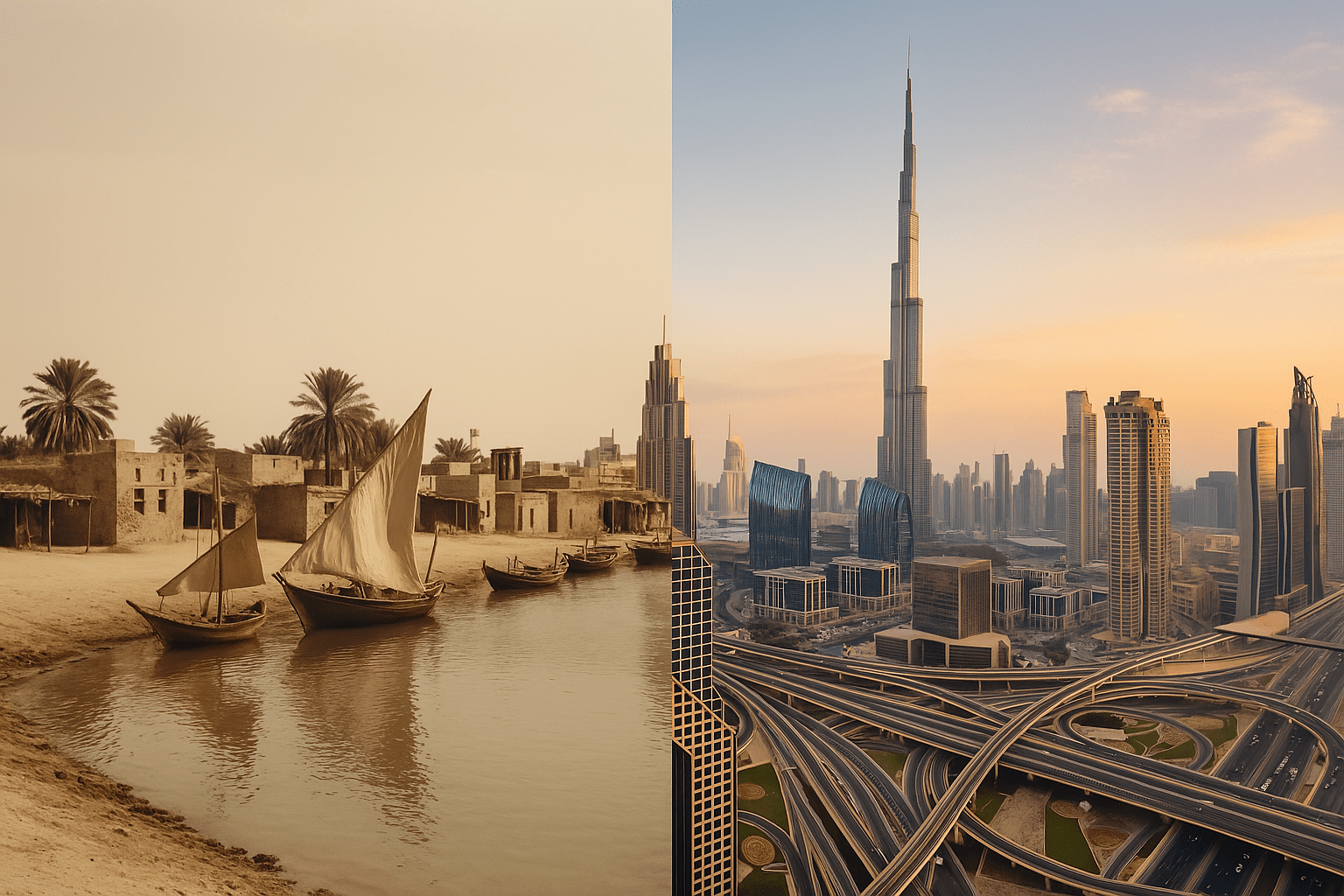Dubai, one of the world’s most modern and glamorous cities, has a rich and fascinating history rooted in trade, tradition, and transformation. Once a quiet fishing village on the Arabian Gulf, it has evolved into a global hub for business, tourism, and innovation. Let’s explore the history of Dubai and how it became the futuristic metropolis we know today.
1. Early Beginnings – Life Before the Skyscrapers
Long before oil and luxury towers, Dubai was a small coastal settlement inhabited by the Bani Yas tribe. Archaeological finds suggest human activity in the region dating back to the Bronze Age (around 3000 BCE). The city’s natural creek made it a prime location for fishing, pearl diving, and trade with nearby regions like Persia, India, and East Africa.
2. The Rise of a Trade Hub (18th – 19th Century)
Dubai was officially established as a town in the early 18th century. By 1833, the Al Maktoum family, still the ruling dynasty today, took control. Thanks to its strategic location, Dubai became a growing port city, welcoming traders and merchants. The city offered low taxes and a business-friendly environment, attracting settlers from Iran and India, laying the foundation for a multicultural society.
3. The Pearl Industry Boom (19th – Early 20th Century)
From the late 1800s to the early 1900s, pearl diving was the lifeline of Dubai’s economy. Hundreds of dhows would sail each season in search of pearls, providing employment and wealth for many. However, the industry collapsed in the 1930s due to the rise of cultured pearls in Japan and the global economic downturn.
4. Discovery of Oil and Transformation (1960s – 1980s)
Everything changed with the discovery of oil in 1966. Under the leadership of Sheikh Rashid bin Saeed Al Maktoum, the city used oil revenues to build infrastructure — roads, ports, schools, hospitals, and airports. In 1971, Dubai joined with other emirates to form the United Arab Emirates (UAE).
Unlike other oil-rich nations, Dubai began investing heavily in diversification early on, focusing on trade, tourism, aviation, and finance.
5. The Vision of Sheikh Mohammed (1990s – 2000s)
Under Sheikh Mohammed bin Rashid Al Maktoum, who became ruler in 2006, Dubai launched ambitious projects to redefine the city on a global scale. Iconic developments like:
- Burj Al Arab – the sail-shaped luxury hotel (1999)
- Palm Jumeirah – a man-made island visible from space (2001)
- Burj Khalifa – the world’s tallest building (2010)
transformed Dubai into a symbol of ambition, innovation, and luxury.
6. Expo 2020 and the Future of Dubai
In 2021, Dubai hosted Expo 2020 (postponed due to COVID-19), attracting millions of visitors and showcasing the city’s commitment to technology, sustainability, and global collaboration. The event cemented Dubai’s status as a forward-thinking city with global influence.
Today, Dubai continues to diversify with initiatives like Dubai 2040 Urban Master Plan, focusing on green spaces, innovation, and sustainable living. It’s also positioning itself as a leader in AI, blockchain, space exploration, and digital finance.
Conclusion
From a small pearl-diving village to a futuristic skyline that touches the clouds, the history of Dubai is a story of vision, resilience, and transformation. Rooted in tradition but focused on the future, Dubai is not just a city — it’s a symbol of what ambition can build.
FAQ
- When was Dubai founded? – Dubai was established as a fishing village in the early 18th century and came under Al Maktoum rule in 1833.
- When was oil discovered in Dubai? – Oil was discovered in 1966, marking the start of modern development.
- What did Dubai do before oil? – Dubai’s economy was based on pearling, fishing, and trade.


